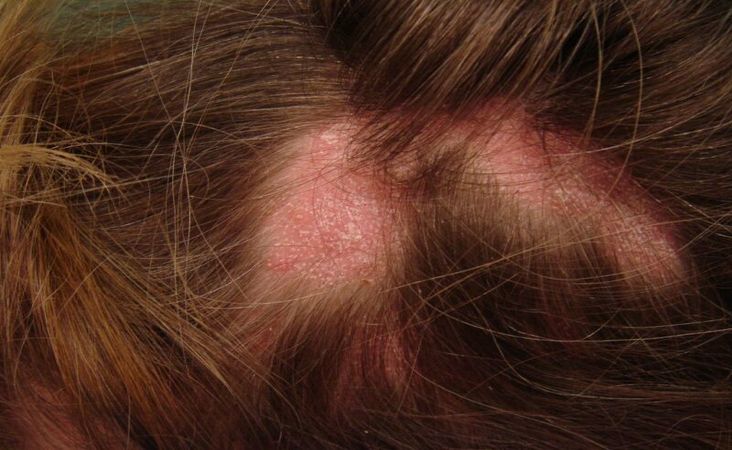Lichen Planopilaris Hair Loss: Causes and Treatments
- Written by Lordhair Team
- Oct 23, 2020
- |
- 9 min read
 Listen to the full text
Listen to the full textThousands of people suffer from scalp itchiness and witness a recession of hairline along with other scalp problems. This condition often turns out to be Lichen Planopilaris hair loss, about which we know very little.
In this blog, Lordhair will share everything you need to know about lichen planopilaris hair loss. From meaning to causes and treatments to recommendations, we will go through all the details of this medical condition.
Let’s begin by understanding what exactly lichen planopilaris is.
Has your hair loss escalated too far? Check out these wigs for women to recover fast
What is lichen planopilaris?
Lichen planopilaris (LPP) is a form of scarring alopecia and a rare inflammatory condition that results in patchy progressive permanent hair loss mainly on the crown and vertex. Sometimes called lichen follicularis or lichen planus, it destroys the hair follicles and leaves behind scars.
LPP commonly develops in association with lichen planus affecting the skin, mucosa, and nails. Lichen planopilaris and hair loss related to it usually affect middle-aged women, though the age range is pretty wide. In some cases, dermatologists have reported men being affected by this hair loss disease but the cases are comparatively fewer.

Clinical features of lichen planopilaris
Most women and men could spot Lichen planopilaris in the form of smooth white patches on the scalp. No hair follicle openings are present around the affected area. Dermatologists have also documented redness around each hair follicle and at the edges of these patches, which may be spiny on palpation.
Lichen planopilaris hair loss can often be spotted at the sides, front and lower back of the scalp. What's worse, hair around these areas can be easily pulled out. If this hair loss condition is not checked on time, the small bald patches may merge to form larger irregular areas.
Although, above are the most common signs of lichen planopilaris hair loss, there are also other symptoms that patients may experience while suffering from this inflammatory condition.
Following are some of the other signs and symptoms of lichen planopilaris:
- Purplish and flat bumps on the inner forearm, wrists, ankle, or sometimes around the genitals
- Blisters that break to form scabs or crusts
- Lacy white patches on the mouth, lips, and tongue
- Painful sores inside the mouth and vagina
- Nail damage
- Change in scalp color
Causes of lichen planopilaris hair loss
The cause of lichen planopilaris hair loss is a subject of ongoing research. Some scientists say that Hepatitis C infection is one of the causes behind this medical condition that triggers hair loss. For those who don't know, it is a liver infection caused by the hepatitis C virus (HCV) which is spread through contact with blood from an infected person. It is mostly contracted on sharing needles or other equipment used to prepare and inject drugs.
In a medical study of a small group, influenza vaccination also led to complications related to lichen planopilaris. It triggers the factor necessary for immune alteration and sufficient for the development of LPP. The period of developing lichen planopilaris hair loss varies depending on the immune responses induced by the vaccination.

Some scientists have also reported pain relievers, such as ibuprofen and naproxen to be the cause behind lichen planopilaris. While these are just the possible causes behind LPP, the major cause is still unknown.
Like lichen planopilaris, frontal fibrosing alopecia can also damage hair. Read and learn!
Treatments for lichen planopilaris
Lichen planopilaris is often difficult to treat, especially at the late-stage where relapses are common and many patients become treatment-resistant. However, if lichen planopilaris hair loss is diagnosed at an early stage, it is somewhat possible to prevent inflammation and spread.
The following treatments are widely recommended by dermatologists to treat lichen planopilaris:
#1 Corticosteroids
Corticosteroids have been found to be one of the most effective agents in the treatment of lichen planopilaris. It can be effectively delivered to the wound with minimal potential for systemic side effects. The efficacy of corticosteroids for treatment is mainly attributed to its anti-inflammatory and immunosuppressive actions.
However, if overused, corticosteroids can lead to weight gain, high blood pressure, diabetes, and osteoporosis. Therefore, it is highly recommended to consult a dermatologist before applying the topical medication.
#2 Hair systems
Hair system is another famous solution widely used by men and women who have reached an advanced stage of hair loss due to lichen planopilaris (LPP) and there is no chance of medicinal recovery. Also known by the names of hairpiece, wig, and topper, it is a non-surgical solution that is designed using 100% natural human hair woven into a skin-friendly base that hides the bald regions and delivers a full head of hair.
Hairpieces are light-weight, soft, and comfortable for the inflamed skin of people suffering from lichen planopilaris related hair loss. It can be attached using scalp friendly tape, glue, or clips. Check out this hair transformation to witness how hair systems can change your overall look:
Benefits of using a hair system
Whilst there are many benefits of getting a hair system to fight lichen planopilaris hair loss, we have listed 3 popular ones:
- Quick result: Unlike corticosteroids, hairpieces provide a quick change in the appearance. There is no waiting time with this hair recovery option. All you need to do is buying a top-notch hairpiece and you are good to go.
- No side effects: Hair systems are preferred by millions of men globally because they bring no side effects along with them. Modern wigs for men and women are completely safe to wear on a daily basis.
- In your budget: Hair systems are highly affordable hair recovery solutions. By spending less than US$1200 a year, you can enjoy a full head of hair without undergoing painful surgery or taking medications.
#3 Hydroxychloroquine
Hydroxychloroquine is another medication popular for checking symptoms of lichen planopilaris among men and women. It is a hydroxylated version of chloroquine, with a similar mechanism of action. Using this medication 5 days a week can check active inflammation and prevent disease progression.
Although hydroxychloroquine usually takes 4-6 months to show its effects, it is still considered as a good option to treat hair loss triggered by lichen planopilaris. However, do take a prescription from a dermatologist before getting this medication.

#4 Acitretin
Acitretin is an oral retinoid (vitamin-A derivative) antibiotic that has shown to be effective for some patients with lichen planopilaris. It slows down the proliferation of dead skin cells and prevents the condition from worsening.
The improvement in the scalp condition begins about two weeks after starting the treatment. The affected skin either peels off or gradually clears. That said, it has some side effects that make people think twice before using it.
Want to recover without medication? Check out these home remedies for hair growth
Following are the side effects of Acitretin:
- Dryness of lips
- Peeling skin, especially on hands and feet
- Dry nostrils that may crust and bleed
- Change in color and texture of hair
- Muscle, joints, or bone aches
- Headaches
Above are some treatments that help prevent the lichen planopilaris from getting worse and fight hair loss. We recommend consulting a doctor in case you are looking forward to using treatments such as corticosteroids, hydroxychloroquine, and acitretin.
Recovery from medical hair loss
Lichen planopilaris is a complex medical condition to deal with as there are no curative therapies. However, using one of the above treatments will sure help you stop the LPP hair loss situation from getting worse.
Always remember to take a prescription from a dermatologist before using medication or antibiotics to treat any medical condition whatsoever. With that said, we have told you everything crucial about lichen planopilaris hair loss!
At Lordhair, we design modern hair systems for men and women that deliver quick hair recovery and bring no side effects. Got queries to ask? Send them at support@lordhair.com to consult our hair experts.


